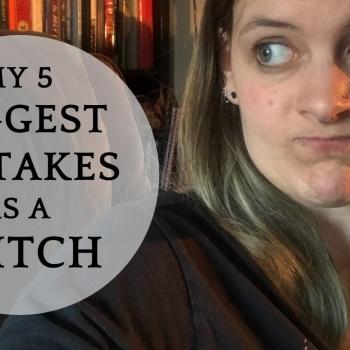“Take yourself seriously, but not too seriously.”
We’re constantly admonishing each other, usually with wry smiles, accompanied by tales of assorted ritual mishaps and youthful missteps. It doesn’t even seem to matter what tradition we practice. We shouldn’t—we’re told—be too serious.
But what does that mean? Presumably we’re here because we think witchcraft is serious stuff. At the same time, most of us have probably had the experience of being around someone who took themselves way too seriously. So where’s the line? If we’re too casual, does our practice become offensive? And what’s the value in laughing at ourselves?
All of these questions have been on my mind thanks to a comment posted in an earlier blog, where I stated that Wicca requires a sense of humor. Here’s what I came up with:
1) Laughing at yourself and your practice requires that you occupy multiple perspectives at once. Considering other positions helps you to engage with yourself more critically, which can lend conviction to your work. If I can appreciate my wand, for example, as both a powerful ritual tool and a stick I found outside to which I’ve ascribed magic powers (harhar), I then can understand how an everyday object comes to possess significance simply at my—the magician’s—word. And the result is that any stick potentially becomes my wand.
2) Laughter is a coping mechanism and a survival strategy. If you make the joke first, you steal the punch line from someone who actually means to hurt you. I learned this as a bullied middle schooler, and still use it. Make your weaknesses your strengths and it becomes harder to hurt you with them.
3) The gods have a sense of humor. Mine do, anyway. One of the things that is most important to me about the gods that I serve is that they can empathize with the human experience. My life involves a lot of laughter. It’s how I express joy and also how I cope with pain. I believe that my gods appreciate that, and laugh right along with me (and at me).
What do you think? What do we means when we say we shouldn’t take ourselves too seriously? What’s the value in that expression (or does it have any at all)?















